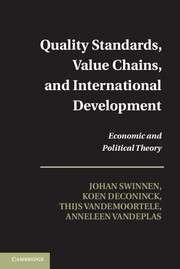Book contents
- Frontmatter
- Contents
- Preface and Acknowledgments
- 1 Introduction
- 2 Modeling Standards
- 3 Efficiency and Equity Effects of Standards
- 4 The Political Economy of Standards and Development
- 5 International Trade and Standards
- 6 Risk, Externalities, and the Nature of Standards
- 7 Endogenous Private and Public Standards in Value Chains
- 8 Butterflies and Political Economy Dynamics in Standard Setting
- 9 The Political Economy of Standards and Inclusion in Value Chains
- 10 Standards, Production Structure, and Inclusion in Value Chains
- 11 Standards, Market Imperfections, and Vertical Coordination in Value Chains
- 12 Market Power and Vertical Coordination in Value Chains
- 13 Price Transmission in Value Chains
- 14 Commodity Characteristics and Value Chain Governance
- 15 Economic Liberalization, Value Chains, and Development
- 16 Standards and Value Chains with Contracting Costs: Toward a General Model
- 17 General Equilibrium Effects of Standards in Value Chains
- References
- Index
11 - Standards, Market Imperfections, and Vertical Coordination in Value Chains
Published online by Cambridge University Press: 05 August 2015
- Frontmatter
- Contents
- Preface and Acknowledgments
- 1 Introduction
- 2 Modeling Standards
- 3 Efficiency and Equity Effects of Standards
- 4 The Political Economy of Standards and Development
- 5 International Trade and Standards
- 6 Risk, Externalities, and the Nature of Standards
- 7 Endogenous Private and Public Standards in Value Chains
- 8 Butterflies and Political Economy Dynamics in Standard Setting
- 9 The Political Economy of Standards and Inclusion in Value Chains
- 10 Standards, Production Structure, and Inclusion in Value Chains
- 11 Standards, Market Imperfections, and Vertical Coordination in Value Chains
- 12 Market Power and Vertical Coordination in Value Chains
- 13 Price Transmission in Value Chains
- 14 Commodity Characteristics and Value Chain Governance
- 15 Economic Liberalization, Value Chains, and Development
- 16 Standards and Value Chains with Contracting Costs: Toward a General Model
- 17 General Equilibrium Effects of Standards in Value Chains
- References
- Index
Summary
Introduction
In Chapter 10 we developed a formal theory of the endogenous process of the introduction of quality and safety standards. We showed that there is an important interaction between standards and production structures. Initial differences in the production structure are shown to influence the emergence of high-standards economic sectors and also which producers are included in the high-standards economy, and which are not. This theory provides an explanation for the remarkable heterogeneity in production structures in high-standards value chains.
The analysis of Chapter 10 assumed for simplicity that producers are not credit constrained and that there are no contract enforcement issues. In real-world settings, however, a crucial factor is the existence of market imperfections, in particular in credit and technology markets. Constrained access to necessary inputs implies major constraints to investments required for quality upgrading, especially for local producers who cannot source from international capital markets. In fact, the introduction of higher quality requirements has coincided with the growth of contracting and technology transfer between buyers and suppliers. Contracts for quality production with local suppliers in developing countries not only specify conditions for delivery and production processes but also include the provision of inputs, credit, technology, and/or management advice (Minten et al., 2009; World Bank, 2005). Empirical evidence shows indeed that vertical coordination, under the form of interlinked contracting, plays an important role in the integration of small producers in high-standards value chains, by improving access to credit, technology and quality inputs in Eastern Europe, Asia, and Africa (Dries et al., 2009; Swinnen, 2006, 2007; World Bank, 2005).
However, the enforcement of contracts for quality production is difficult in developing countries, which are often characterized by poorly functioning enforcement institutions – another crucial factor. These enforcement problems can add significantly to the cost of contracting and may prevent actual contracting from taking place.
In this chapter we formally analyze how vertical coordination can play a role in the presence of factor market imperfections and weak contract enforcement. We analyze how these factors affect surplus creation and rent distribution and how the process of development affects both. Our model starts from the assumption that vertical coordination can emerge as a spontaneous response to, on the one hand, the demand for high-standards products and on the other hand suppliers’ credit constraints.
- Type
- Chapter
- Information
- Quality Standards, Value Chains, and International DevelopmentEconomic and Political Theory, pp. 162 - 192Publisher: Cambridge University PressPrint publication year: 2015



